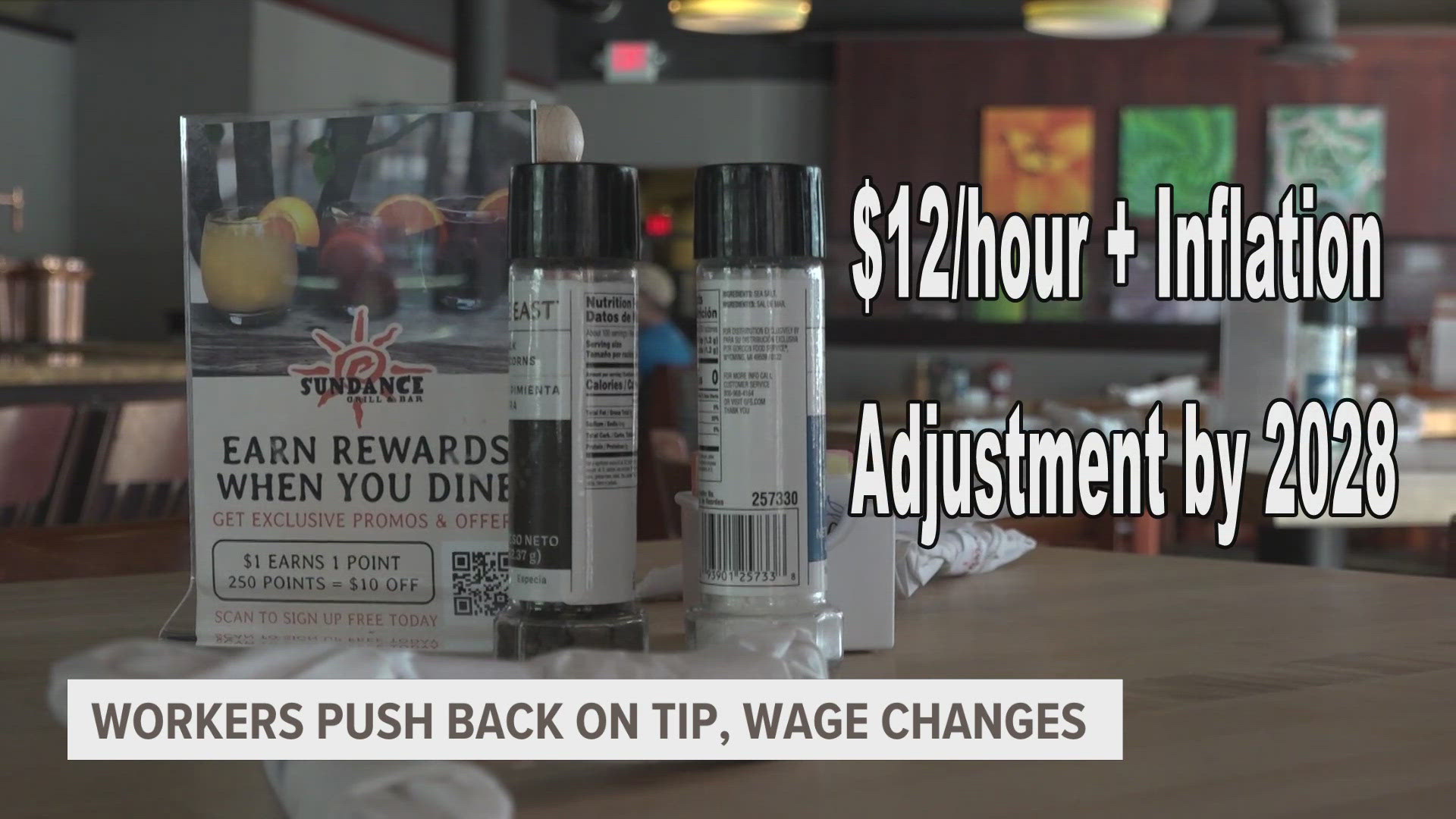GRAND RAPIDS, Mich. — Going about what would otherwise be a typical Thursday morning at the Sundance Grill & Bar in downtown Grand Rapids, one thing that stood out was the bright orange shirts Hailey Jones and her co-workers wore, outfitted with the phrase "Save MI Tips" emboldened across their chests.
"Me, personally, I make more in tips than I would with minimum wage," Jones said.
It's people like Jones that say they could be impacted by a recent ruling from the Michigan Supreme Court that is set to raise the state's minimum wage to $12 per hour plus inflation adjustment by 2028, but do away with the state's tip credit by 2029.
"I haven't heard honestly, a single person that's really agreed with it," she said.
The ruling came out of laws passed by the state legislature in 2018.
That year, organizers had sought to put petitions to the legislature relating to wages and worker benefits.
One such petition put forth for lawmakers to decide upon was regarding whether to raise the state's minimum wage to at least $12 per hour by 2022 and essentially do away with the tip credit. That tip credit says that the minimum wage for tipped workers can stand at 38% of the general minimum wage, with tips supplementing that.
At first, the legislature seemed to accept, passing laws that included stipulations brought forth in the petition and another petition regarding workers' sick time.
But after that year's elections, according to the Court's ruling, the legislature then amended the laws by, in part, keeping that 38% tip credit intact and slowing the minimum wage hike to instead reach $12 by 2030.
But the Court just weeks ago ruled in a 4-3 decision that this "adopt-and-amend" strategy that the legislature used in 2018 was unconstitutional.
In the Court's majority opinion, it held that "allowing the Legislature to bypass the voters and repeal the very same law it just passed in the same legislative session thwarts the voters’ ability to participate in the lawmaking process."
"We reiterate that the Legislature acted unconstitutionally when it enacted the Amended Wage Act and the Amended Earned Sick Time Act," the opinion read. "It did not, however, act unconstitutionally when it adopted the original initiative petitions without change. Accordingly, our remedy revives the constitutional status quo while accounting for the passage of time."
As such, the Court ruled, that minimum wage changes will follow the same timeline they would have under the original laws over the next several years - reaching $12 per hour plus inflation adjustment by 2028 and doing away with the tip credit by 2029.
Now, some like Jones fear what they see as the potential consequences.
"People are coming, and obviously the prices would get raised if restaurants have to pay servers more," Jones said. "So, [customers are] paying more for their meals in general, and they know that we're getting paid a higher hourly wage, so they're going to be less inclined to tip."
Some also fear the possibility, given more base wage pay across the board, that job cuts in the industry may be made.
A flyer disseminated at Sundance Thursday as local workers and operators met with lawmakers to discuss concerns claimed that 79% of servers feared their jobs being cut following an elimination of the tip credit.
Given the concerns, lawmakers from both sides of the aisle met with workers at Sundance take input and factor it into any possible solution.
"I see some, if you will, low-hanging fruit," State Rep. Carol Glanville (D-Walker) said. "I don't want to speak to details, because, you know, that needs to be worked out. But I think there are definitely some positive ways forward."
"My preferred method would be go to go back to the 2018 legislation - 2019, whatever year it was - and to preserve that," State Rep. Patrick Outman (R-Six Lakes) said. "That would be my preferred choice, but there's probably a middle ground in between there. Whatever gets the job done, I'm all for it."
The first phase of the new minimum wage and tip credit timeline is set to take effect in February, when, under the court's ruling, the minimum wage will be set at $10 per hour with a 48% tip credit.
In the 6 months to go until then, some believe the clock is ticking for the legislature to come up with a fix.

